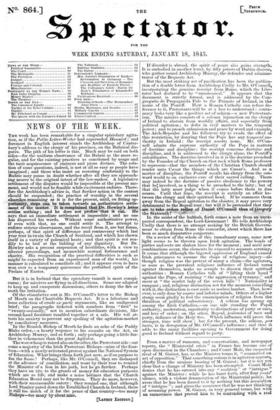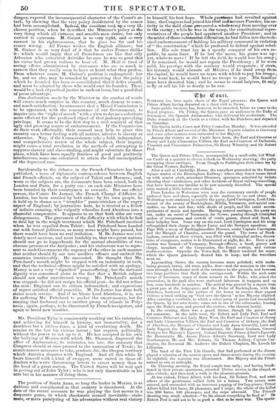From a matter of rumours, and conversations, and newspaper reports,
the " Ministerial crisis" in France has become one of open discussion in the Chambers ; and Count Mole, the suspected rival of M. Guizot, has, as the Minister terms it, "committed an. act of opposition." That something serious is in agitation appears, chiefly from the anxious bearing of M. Guizot; but it is not yet clear that a change of Ministry has been attempted. Count Mole denies that he has entered into any " coalition " or "mtrigue " against the Minister : while he has burst forth, after four years' silence, with a violent denunciation of the Ministerial policy, he avers that he has been forced to it by nothing but this accusation of " intrigue " ; and gives the assurance that he was not thinking of assuming power. M. Guizot, in very general terms, but with an earnestness that proved him to be contending with a real
danger, exposed the inconsequential character of the Count's at- tack, by showing that the very policy desiderated by the censor had been accomplished. Indeed, the assailant took up a very ill- chosen position, when he described the Minister's policy as the very thing which all virtuous and sensible men desire, but only carried to extremes. M. Guizot is so very right, and so very earnest in his righteousness, that he goes too far and be- comes wrong. All France wishes the English alliance; but M. Guizot is so very fond of it that he makes France dislike it : which would imply that all Frenchmen are like that silly Athenian who ostracized Aristides because he was so good that his virtue had grown tedious to hear of. M. Mole is tired of seeing affairs administered by statesmen who are so much in earnest that they really seem to have at heart what they profess. From whatever cause, M. Guizot's position is endangered : but - he, and we also, may be consoled by perceiving that the policy which he founded has been so consolidated that it defies assault, and must be adopted by those who would oust its founder. There . would be a lack of poetical justice in such an issue, but a good deal of prose advantage. One declaration made by the Minister in the combat of words will create much surprise in this country, much dismay to some, and much satisfaction : he announces that a Mixed Commission is to be appointed, with the concurrence of our Government, to
• inquire into the "right of search" with a view to devise a substitute more efficient for the professed object of that jealousy-provoking -privilege. It seems to be the first step to a real removal of that 'ugly and growing source of embarrassment. If the Commission do their work effectually, their counsel may help to place this country on a better footing with all nations, adverse to slavery or otherwise. Nay, if the Commissioners take a bold, independent, -and comprehensive review of the whole subject, their inquiry might cause a total revolution in the methods of attempting to suppress slavery and slave-trading, and might substitute for those plans, which have been equally fruitless of good and positively mischievous, some one calculated to attain the full emancipation of the depressed race.



























